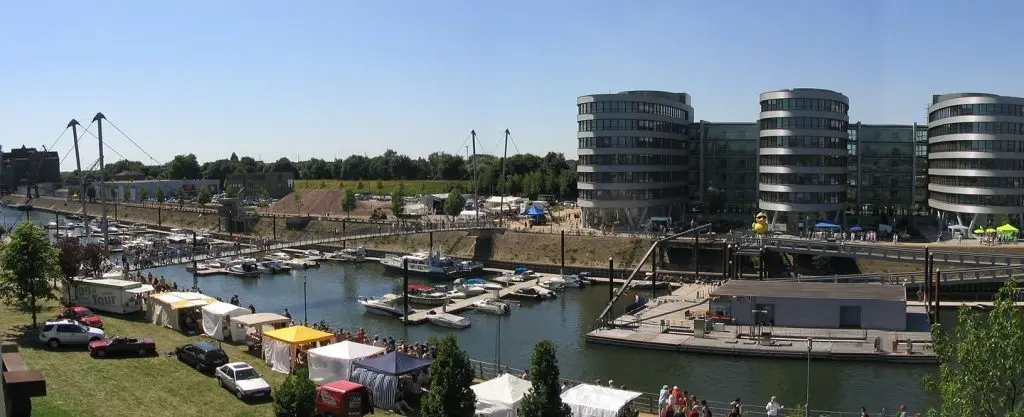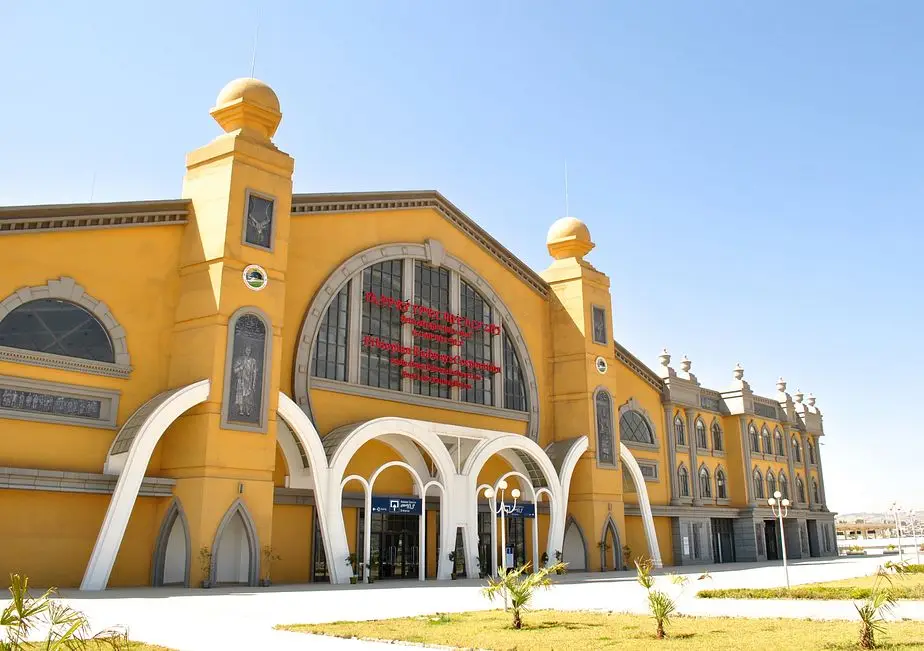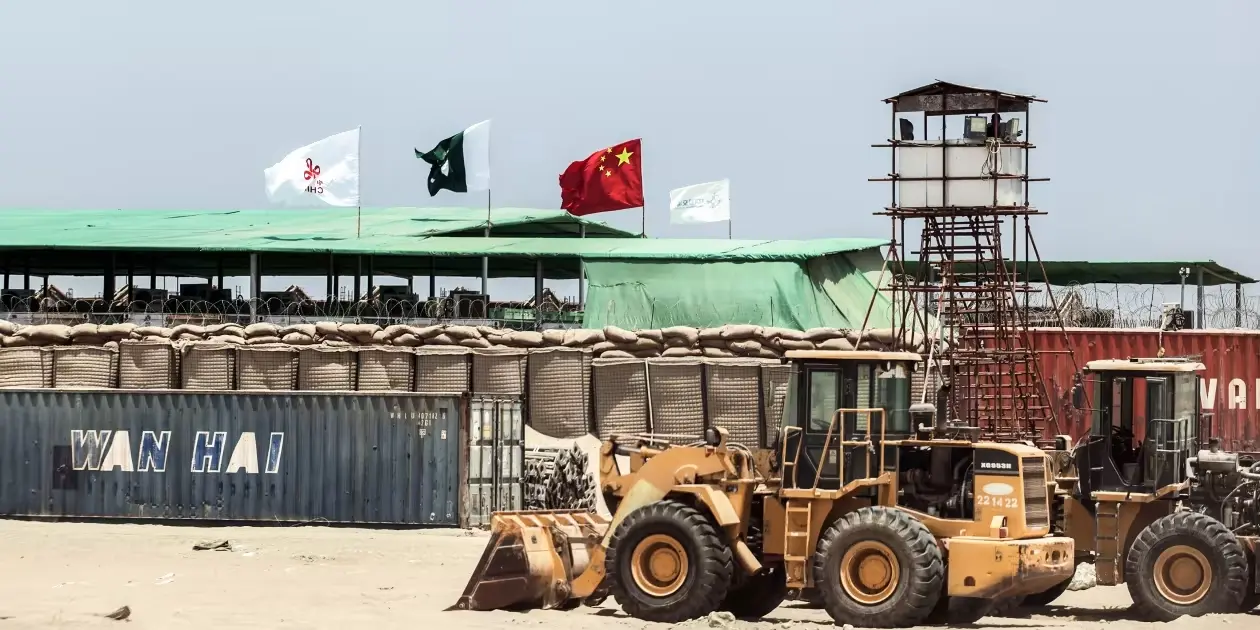‘Germany’s China City’: Iron Silk Road Terminal of Duisburg
By
Giulia Romano, Markus Taube

For about ten years, hardly any other European city has been conferred as much attention in Chinese media, political and business circles as the city of Duisburg. A report in the Financial Times of April 8, 2019, in which the correspondent reports with amazement on a peculiar map at Shanghai Pudong Airport, has become famous. As the correspondent relates, only four European cities were marked on this map: Berlin, London, Paris, and Duisburg. And the largest marker was reserved for Duisburg. For a European observer, this selection seems strange, to say the least. Duisburg is an old industrial city on the Western periphery of the Ruhr Valley, struggling with the decline of heavy industry and structural change, and plagued by permanent financial worries. The puzzle is only solved when the city’s specific association with China’s Belt and Road Initiative (BRI), and especially its prominent role for the operations of the Iron Silk Road, is included in the consideration. In 2013 the city of Duisburg was chosen by Chinese political leaders as the main European terminal of their intercontinental railway links – without conferring with city officials beforehand. Since then, Duisburg has – nolens volens – become part of the grand Chinese narrative of a new global connectivity facilitated by the BRI. The local government did not complain about this choice. Quite the contrary, it has attempted to capitalize on the city’s prominent status in China, adopting the brand ‘Germany’s China City’ and trying to attract Chinese investors and China-related business to Duisburg.
In the following, we will first trace how Duisburg became the European main station of the Iron Silk Road and then question what substance is behind the city’s claim to be Germany’s China City. The story we tell is one where business acumen and political aspirations do not match. The result is a ‘two-speed China-nexus’ that manifests itself as of very high intensity with regard to the logistics sector, but features hardly any substance for the city as a whole.
Challenges Ahead
The process by which the city of Duisburg became a central dot on the BRI map illustrates the special role of non-state actors and the power of bottom-up initiatives for the development of the BRI as a whole. In the beginning, two companies – the global electronics producer Hewlett-Packard (today: HP) and Duisburger Hafengesellschaft (global presence as: duisport), the local port and logistics operator – were just interested in finding a solution to a logistics problem that would allow them to create new added value for all stakeholders involved in China-European goods exchanges.
Taking advantage of its location at the confluence of the Rhine and Ruhr rivers, excellent connections to the German and European rail and highway networks, and proximity to Düsseldorf Airport, duisport had positioned itself very successfully as a trimodal transport hub and logistics service provider since the late 1990s. Its customers included Hewlett-Packard, which had invested in large logistics and distribution centers in the region. Hewlett-Packard had also established large production facilities in Chongqing from where it shipped its goods to the global markets. But the transport between the manufacturing facilities in Western China and customers all over the world had proved to constitute the weak link in this business model. Shipping from Eastern China involved excessive costs, as well as long times and various uncertainties. Against this background, the concrete idea for a direct train connecting the manufacturing center in Chongqing with the European logistics hub in Duisburg to cut transportation costs and times was born over a coffee during a conference in the Baltic States in 2009, where the top managers of both companies met.
Scrutinizing the viability of the business case, both firms eventually hit upon some administrative-regulatory obstacles for their intercontinental logistics project. It is at this point that governmental bodies from China and the Central Asian states were involved for the first time. It became their job to clear these barriers out of the way and accommodate the business initiative at the political level. First point of contact was the Chongqing municipal government, which moved up the issue to the central government, at the time still headed by President Hu Jintao and Premier Wen Jiabao. It was here that the administrative barriers to a direct train link between Chongqing and Duisburg were pushed aside, while customs clearance issues and regulatory concerns were solved. The establishment of the Eurasian Customs Union between Belarus, Kazakhstan, and Russia in 2010 also greatly facilitated this process, reducing the number of customs territories involved to no more than three.
Hewlett-Packard contracted with the German rail company DB Schenker to operate the train transport. The first direct train between Chongqing and Duisburg finally travelled in March 2011, loaded exclusively with Hewlett-Packard products. Some more trains began to follow, but the intercontinental direct train remained a niche product for very specific needs. It was only in 2013, when the Xi Jinping administration launched the idea of a revival of the Silk Road and framed this in a comprehensive foreign policy initiative, that rail-transport between China and Europe was massively supported (and heavily subsidized) by the Chinese government.
Duisburg government played virtually no role in the process outlined so far. It was also uninformed about duisport’s business activities and was taken by surprise when, in summer 2013, a Duisburg government official was informed by the Chinese ambassador that the city was to play an important role in the BRI. The government was even more surprised when a few months later President Xi Jinping contemplated an official visit to Duisburg. This took place in March 2014, with Xi symbolically welcoming a train arriving from China. For duisport this represented the highest accolade possible and paved the way for a massive expansion of its business as the most important logistics hub at the European end of the Iron Silk Road.
Duisburg’s Endeavours to Become Germany’s China City
In the city of Duisburg, these developments launched a discussion on how to take advantage of that unexpected attention from Beijing, as well as of Chinese companies and local governments, which had been informed by their leaders that Duisburg was the ‘end point of the Silk Road’. Suddenly a large and ever-increasing number of Chinese government and business delegations expressed their wish to visit the city. In the year before the Corona Pandemic stopped all such activities more than one Chinese delegation toured the city every week.
The position of a ‘China Representative for the City of Duisburg’ (‘China-Beauftragter der Stadt Duisburg’) was created to welcome the visitors and advise the mayor on China-related matters. The position was filled by Johannes Pflug, who as a native of Duisburg and long-time member of the German Bundestag (the German parliament) with expertise in East Asia, combined an outstanding set of skills and experiences. Johannes Pflug started a plethora of activities to link Duisburg up with China and explore new business opportunities. Among them, a ‘China Business Network Duisburg’ (CBND) was established as a joint initiative by the city government and local business to network local China-related businesses and reach out to potential Chinese investors. Moreover, in 2017, the local Gesellschaft für Wirtschaftsförderung (GFW – the municipal business development agency) established a special ‘China Desk’ to market Duisburg as a business location in China and to serve Chinese investors. A native Chinese speaker manages the desk, actively helping Chinese investors to set up their business in Duisburg. In collaboration with a local university of applied sciences, GFW also created a ‘Business Start-Up Seminar for Chinese in Germany’ to encourage potential young entrepreneurs graduated in the region to stay in Duisburg and set up their own (China-oriented) business.
The outcome of all these activities is sobering. While the logistics operations of duisport have thrived, operating up to one third of all rail-bound traffic between China and Europe, the China-effect has hardly had any impact in the remainder of the local economy. Since the first Iron Silk Road trains arrived in Duisburg, ca. 120 Chinese firms have registered operations in the city, mostly doing business in the fields of export/import and e-commerce. However, most of these firms are small and micro enterprises, exerting only minor impact on the local economy and labor market. Only a quarter of these companies have expatriates on site; the other companies are run by managing partners and their families. The only exception has been the opening of the European headquarters of Nanjing Gear Company (NGC), a company specializing in gear and drive technology as well as in high-performance engines. Beyond these developments, hardly any spillovers to other economic sectors have been recorded so far.
There is not much to report even at the level of official cooperation between the local government and Chinese actors. In 2018 the city of Duisburg and its operating agents entered into framework agreements with Huawei to set up a cloud platform supporting local smart city development. Based on Huawei technologies and experience, the project was designed to transform the city of Duisburg into ‘an innovative and digital benchmark city in Western Europe‘. However, none of these projects has moved beyond an early planning stage. Today, implementation has become highly unlikely.
Duisport’s and Duisburg’s China-Nexus – Different Realities
The logistics service provider duisport has certainly become a major player for the operations of the Iron Silk Road. And transport logistics along the Iron Silk Road has proven crisis resistant. Neither the Corona Pandemic, nor the disruptions caused by the Russian invasion of Ukraine have been able to disrupt the business model. The zero-Covid lockdowns and massive delays at Chinese sea ports have even further strengthened rail transport, as firms were forced to send their goods by other means than ocean-going container ships. duisport has profited over-proportionally from these developments. Currently the company is building a new container terminal – the ‘Duisburg Gateway Terminal’ – that will expand its capacity to one hundred Iron Silk Road trains per week. This investment project is the largest so far involving Chinese participation in Duisburg. duisport and COSCO Shipping each hold 30% of the joint venture operating the terminal, with minority shares held by Hupac SA and HTS Group. At the same time, duisport is also expanding to China, participating in the establishment of a multimodal logistics hub modelled on duisport’s Duisburg facilities in Chongqing, as well as in the construction of a network of 13 Chinese rail terminals alongside inner-Chinese Iron Silk Road links.
The city of Duisburg, on its side, falls short of its claim to be ‘Germany’s China city’. Despite of considerable political will and efforts, the city has not been able to attract a significant number of China-oriented business and leverage the city’s unique function as Europe’s most important inland hub for trade with China. We understand a combination of factors to have led to these diverging development patterns:
- Lacking communication between duisport and Duisburg. Although Duisburg owns one third of duisport (two thirds are held by the State of North Rhine-Westphalia), the city did not have control over the entrepreneurial agency of its former CEO. As such business development at duisport and governmental city development did not match as they should have.
- The City of Duisburg has only limited agency. Duisburg’s city government is greatly restricted in the scope of accommodating policies and incentives it can provide to potential investors. As such potential investors may find other locations more accommodating.
- Duisburg is integral part of a larger economic region. The Duisburg business environment is fully embedded in the Ruhr Valley as well as Düsseldorf, the capital of the state of North Rhine-Westphalia, which is located less than 30 km to the south. As such investors engaging in business operations in Duisburg may still prefer to locate their offices in the more attractive environments of Düsseldorf or elsewhere in the region.
- The political climate has deteriorated. In recent years the political relations between China and Germany have trended towards greater suspicion and distrust. The classification of China as a systemic rival by the European Union and the fear of becoming dependent of (or even be spied upon by) Huawei’s 5G-technology has had a negative impact on the implementation of existing project and all further engagement with China.
Still, the government of Duisburg is adamant to continue its dialogue with China and strengthen cooperation. With the retirement of Johannes Pflug the position of the ‘China Representative for the City of Duisburg’ has been newly staffed with a former top manager of duisport. In addition, in 2021 a new department for China affairs directly attached to the office of the Mayor has been set up. Duisburg has not yet given up its dream to become ‘Germany’s China City’.



